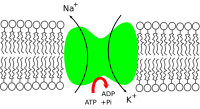Na+/K+-ATPase
(Redirected from Sodium-potassium pump)

Na+/K+-ATPase is an enzyme found in the plasma membrane. It is sodium-potassium adenosine triphosphatase, also known as the 'Na+/K+ pump', 'sodium-potassium pump', or simply 'sodium pump', for short. It was first discovered by Jens Christian Skou who won a Nobel Prize in Chemistry in 1997.
The enzyme moves Na+ (sodium) ions out of the cell and replaces them with K+ (potassium) ions. This keeps the Na+ ions outside of the cell membrane, and keeps the K+ ions on the inside of the cell membrane. The process works in the opposite direction of diffusion.[1]
For every three sodium ions that get pumped out of the cell, two potassium ions get pumped into the cell. One phosphate group is still bound to the pump.
